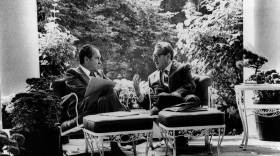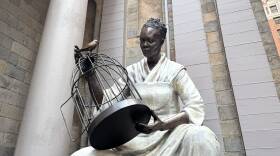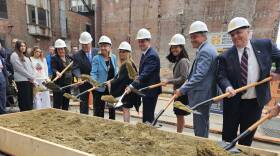-
A frozen cannon trail: How a Berkshires mission tested a young bookseller
A patchwork of volunteer historians across Western Massachusetts continue to zero in on the likely path of Henry Knox, 250 years after he managed an astonishing feat of engineering and transportation. -
In Person
Beyond the Page with Marie Benedict
Beyond the Page is thrilled to welcome back New York Times and USA Today bestselling author Marie Benedict for an unforgettable evening at GBH Studios to celebrate her spellbinding new novel, Daughter of Egypt.
Join us for a fascinating conversation as Benedict shares the real history and inspiration behind her latest work, dives into the lives of the trailblazing women who shaped it, and answers your questions about bringing hidden stories to light.
Each ticket purchase for this special, in-person event includes:- Admission to the live conversation on Monday, March 30
- A SIGNED copy of Marie Benedict’s Daughter of Egypt
Don’t miss out on this evening of insight and adventure with one of today’s most celebrated voices in historical fiction! -
Massachusetts Historical Society’s chief historian steps down after half century of service
In his 47-year tenure, Peter Drummey has witnessed a historical arc of his own — from seeing the research room’s first portable computer to curating tours for U.S. presidents. -
New walking tour shines light on Boston’s overlooked abolitionist history
The "Abolition Acre" self-guided walking tour was recently established by the nonprofit Beacon Hill Scholars to raise awareness about the city's anti-slavery movement. -
Remembering Carlton Fisk’s walk-off home run in the 1975 World Series
Baseball writer Roger Angell immortalized the moment with his New Yorker essay “Agincourt and After: An epochal World Series, reviewed.” -
Talking AMERICAN EXPERIENCE'S Kissinger with Filmmaker Barak Goodman
In this interview, hear from filmmaker Barak Goodman about the new film from AMERICAN EXPERIENCE, Kissinger, which examines Dr. Henry Kissinger's life from his childhood through his time as Nixon's Secretary of State. -
King’s Chapel unveiling first-of-its-kind statue to honor people enslaved by its forebears
The statue of a Black woman releasing birds to freedom will represent the more than 200 enslaved people identified by the church. -
Mass. not among states required to teach about 9/11
Fourteen states require schools to teach the subject of 9/11, but Massachusetts is not one of them. -
Upcoming Holocaust Museum Boston breaks ground downtown
The museum will focus on educating visitors and the community about the Holocaust. -
You can ride in World War II tanks at this Massachusetts museum
Eight decades after the end of World War II, a Massachusetts museum maintains and operates the massive relics to perpetuate an understanding of democracy — and the sacrifices required to sustain it.









